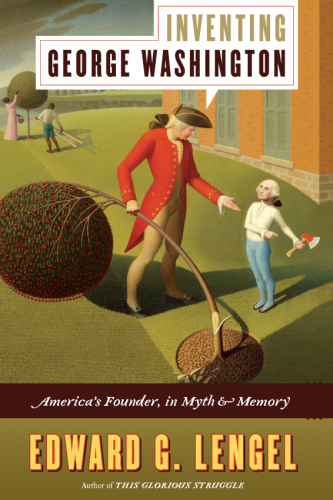
Inventing George Washington
America's Founder, in Myth and Memory
کتاب های مرتبط
- اطلاعات
- نقد و بررسی
- دیدگاه کاربران
نقد و بررسی

February 7, 2011
Lengel, editor in chief of the Washington Papers project and author of General George Washington: A Military Life, contributes a worthy addition to the plentiful scholarship of George Washington, if for no other reason than his naysayer approach to that very scholarship; Lengel wants to set the record straight, and he takes on the "cheats and phonies in addition to the well-meaning storytellers have capitalized on the American public's insatiable and ever-changing demand for information about" Washington. It's time to forget the cherry tree mythologies of our schoolbooks. Besides dismissing that tale (and the tellers who perpetrated it) outright, Lengel explores the surprisingly seedy underbelly of Washington biographers. For instance, one of the men who hopped on the George Washington myth-making bandwagon was no less than showman P.T. Barnum. Lengel's account of Barnum acquiring (for $1000) and then parading elderly African-American Joice Heth around the East Coast as "the 161-year-old slave mammy" to George Washington is equally disturbing and gripping; put on display 14 hours a day for a paying public, Heth soon died, and Barnum held a public autopsy—charging 50 cents a head. Lengel's end-of-book rant, when he tries to settle a score with filmmakers making a project for the Washington estate is a rare misstep in an otherwise fascinating, dryly humorous book.

November 1, 2010
Not a biography but a frothy history of the many energetic, often wacky efforts to turn George Washington into a godlike national icon whose life provides lessons in moral uplift.
Few deny that Washington did not cut down the cherry tree or throw a dollar across the Potomac, but historian Lengel (This Glorious Struggle: George Washington's Revolutionary War Letters, 2008, etc.), editor in chief of the Washington Papers project, points out that a PBS documentary examined his indignant refusal to make himself king in 1783 after leading the Continental Army to victory—an event that also never happened. The author stresses that every generation invents a Washington that agrees with its beliefs. Soon after his 1799 death, writers (including Parson Weems, of cherry-tree fame) produced a classical Washington—restrained, solemn and honorable. Victorian times required a romantic figure, passionately pursuing women as he agonized over his nation's fate, regularly appealing to God for guidance. Twentieth-century materialism converted him into a cold-hearted businessman, but a resurgence of nationalistic patriotism after Ronald Reagan's election revived the old-school father figure. Good 18th-century rationalists, our founding fathers were not notably pious, Washington included. However, by the following century this became unacceptable, and Lengel devotes a fascinating section to the torrent of sermons, invented quotations, anecdotes (everyone seemed to stumble upon Washington kneeling in prayer) and even a forged prayer diary designed to illustrate his evangelical Christian fervor. That these are fiction has not discouraged today's political leaders, religious and conservative websites, TV commentators and documentaries from presenting them as truth.
Readers will chuckle at this well-presented avalanche of nonsense, but squirm to realize that our leaders, media, journalists and even historians regularly accept it.
(COPYRIGHT (2010) KIRKUS REVIEWS/NIELSEN BUSINESS MEDIA, INC. ALL RIGHTS RESERVED.)

December 15, 2010
Lengels survey of falsehoods told or believed about George Washington inspects biographies, manuscripts, paintings, and films that skirt verisimilitude in the quest for popularity. Hardly humorless rebukes to mythmaking panderers to the hoi polloi, Lengels wry critiques of specific works connect stories and facts of dubious provenance with a generations propensity to believe them. His attentiveness to evolving markets for information about Washington readily explains why Parson Weems cherry-tree story became a phenomenally popular tutorial in Washingtons virtues, how mid-nineteenth-century confections about young Georges romances answered to the feminine book-buying demographic, that a forgers productions from the same period still deceive unwary manuscript dealers, and how yearning for a Christian Washington inspired fabrications of his religious life that contemporary public figures still cite. The persistence of fabrications despite twentieth-century debunking still infects even careful biographies, such as, Lengel admits, his own General George Washington (2005). As the latest life, Ron Chernows Washington (2010), undergoes myth-searching scrutiny, its likely success paves the way for Lengels entertaining commiseration with posteritys imagined George Washington.(Reprinted with permission of Booklist, copyright 2010, American Library Association.)

























دیدگاه کاربران